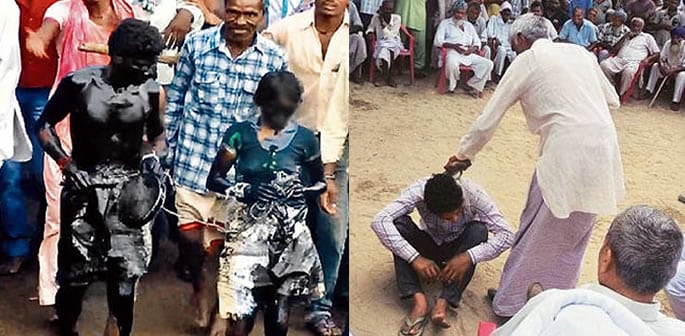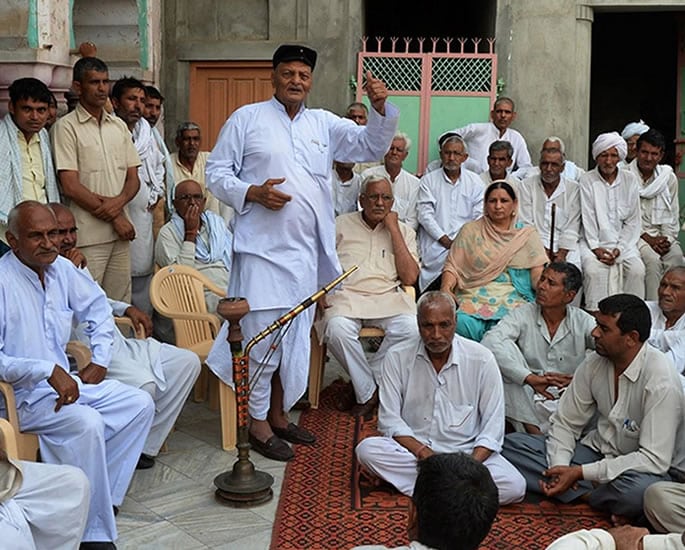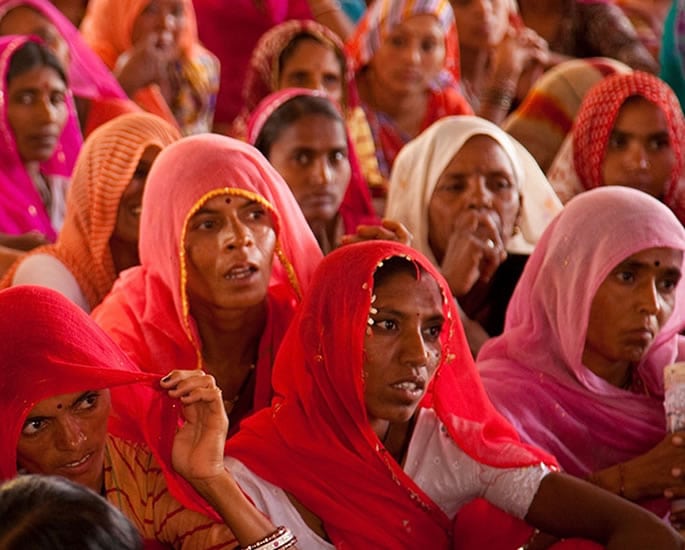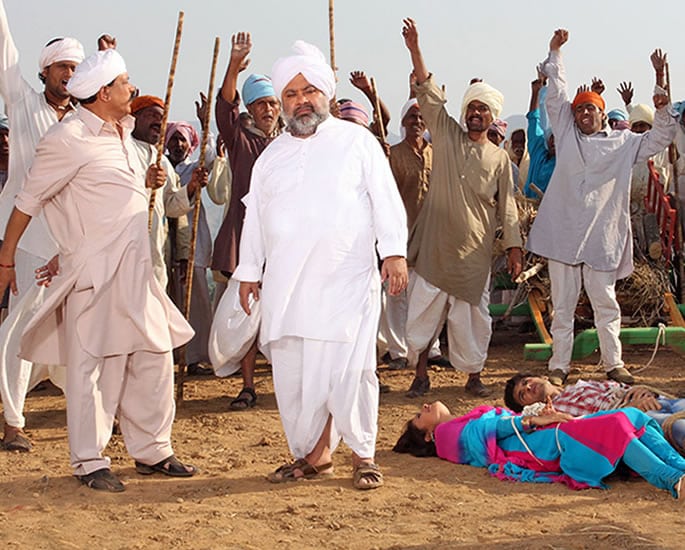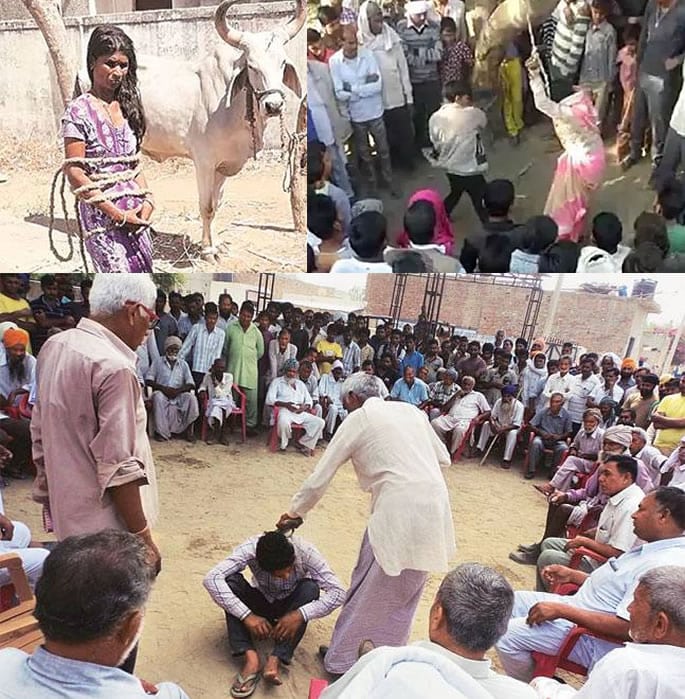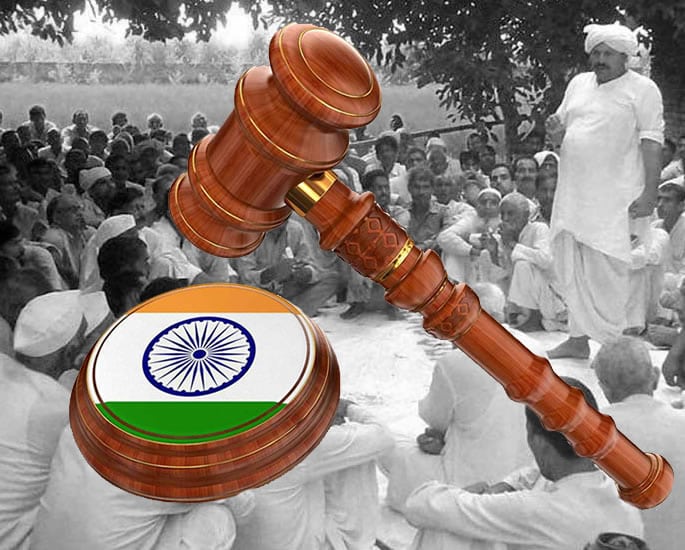What is a crime in a village? Is it a crime against the law or a crime against culture?
Village punishments in India are widely practised across the country and other South Asian nations.
Taking the law into one’s own hand is nothing new in the villages of India.
Especially in deprived and less educated villages where males of the family and elders have total dominance over what people can and cannot do.
Using panchayats (village councils) to dictate the way life is judged at a local village level, punishments handed out have attracted the attention of media.
Over the recent years, the media has reported acts of violence against teens, women and suspected ‘rapists’.
This also includes thieves who have committed ‘crimes’ and then had to endure atrocities beyond imagination.
While sometimes criminals who are caught red-handed have been filmed being given beating as punishment, there are others who have heard to have been humiliated beyond comprehension and others, even killed.
This is a taboo which has caused a lot of controversies, questioned morals and intentions.
DESIblitz explores further the controls, the crimes, the misbehaviours and the punishments handed out by panchayats.
The Panchayats and Elders
Unknown to many, village elders have a lot of power and due to being of old age have the respect of the villagers.
A tradition which began centuries back where elders were seen as just peacemakers. This is still the case in many third world countries across Asia and Africa.
In South Asia, when a dispute happens, elders of both parties are called upon to resolve the situation and in most occasions, it is done in a civil manner.
However, for some, this is just the opportunity they need to enforce authority and control. From a mindset which leads to deadly crimes such as honour killing to publicly beating the said culprit or worse.
But, what is a crime in a village? Is it a crime against the law or a crime against culture?
In hindsight, any act can be coerced into being called an act of crime.
These acts are not harmful towards anyone and are rather things that just don’t sit well with the village ‘customs and beliefs’.
The decisions are made by the ‘panchayats’ which is made up of 5 people and they serve as village councils. These highly respectable members deal with matters within the village by ordering a meeting.
Here people from different parties can provide evidence for or against either like a court system. The crimes dealt with are not that of a high court and are rather societal matters.
The panchayats are not like other village elders, they have their own governed way holding a hearing.
Considering both parties and then charging the wrong member or party. Based on the hearing, the village punishment is decided.
Most of the time, a very democratic lead is followed and the verdict or sentencing is fair and right for the crime committed.
However, bribery is often used to get to the village council and decisions can often lead to village punishments served which are not always ethical or legal.
In North India especially, exist the of Khap panchayats which are a union of a few villages, formed to carry out justice and punishments to represent the villages.
Khaps have been branded as “Kangaroo Courts” for their rulings and punishments which include the fines, violence, public beatings and even encouraging the buying of brides and child marriages.
However, times are beginning change and the panchayat our parents and grandparent knew are not so much the same.
Khaps are trying to “erase the bloody past” and introducing reforms.
As a turn of events, younger men are beginning to take on the role of the panchayat in some villages, as progression in the country takes place.
Impact on Women
While most crimes seen are dealt with by men and village punishments decided by men, the women of Indian villages are also involved in punishing individuals for crime.
Men suspected of rape and sexual assault are dealt with by women. Groups of women have been reported to have killed suspected rapists on multiple occasions.
It is believed by many that women take the law into their own hands because they are often ignored by law enforcement and are not given the justice they deserve.
For instance, in 20o5 a group of 200 women came together to kill a serial rapist known as Akku Yadav.
Village punishments do not do women justice and rather go against women no matter the crime.
It’s not always about crimes. For example, in 2017, girls were banned from wearing jeans and using mobile phones in a khap ruling issued in Haryana for fear of fuelling sex crimes.
The women tend to suffer from the way elders operate their judge and jury system.
Females of the family are on multiple occasions also frequently made to pay for their father or husband’s crime.
Women are seen as the nucleus of the family, so their reputation determines the honour of the family. A woman of less respect or loose morals represents a dishonourable family.
Lower castes and the poor are common targets. It is often the intent of the jury, to shame such women and hand out immoral punishments to those who have less power or are not wealthy.
Women are still treated as ‘properties of men ‘ and khaps are seen to encourage this.
For example, in Haryana, a panchayat head has estimated that 10-15 “brides” were probably sold into each of the 42 villages under the khap’s control in the last 10 years.
One bride who was sold for Rs. 80,000 (approx £863) was Meera Deka who was 25 years old at the time. She was forced to leave her parents home from Assam and moved to Haryana to marry and live with her husband in Haryana.
Coming from a completely different state, she says:
“All day I am washing, cleaning and cooking. I don’t understand their language, I don’t like their food. I hate my life here.”
But laws are gradually changing to stop these kinds of practices.
Typical Crimes
The relationship of girls and women in a village is seen to be of ‘sisters’ or ‘mothers’ to the men. So, if a man does commit any kind of violation of this view. The village does not view this with kind eyes.
Abuse of young girls in a village is something that if it takes place is vehemently not tolerated by any means by a panchayat or the elders and is dealt with using the strictest of punishments.
The most typical crime punished is ‘adultery’ or suspecting individuals of having an affair. This kind of matter definitely attracts village punishment.
The punishment is usually served to the accused female for her participation more than the man. Or it will be served to both, to be made an example of.
Accusations can be made out of revenge or stem from rumours. Some people may be punished based on false accusations and witnesses.
In strict villages, the union of man and women from two different castes or the idea of two people marrying out love is seen as a punishable crime. As this crime brings ‘shame’ upon the village and community or goes against the parents.
A woman disobeying her husband or dishonouring her mother in law is one common regarding women.
The panchayat can help with things like helping the man set the divorce in motion. Especially in Muslim villages, in some villages, the same is available to women who want a divorce or make a complaint against their husband.
Stealing cattle and livestock has been an age-old crime among villages especially during certain festival seasons like the where the livestock can be sold at the highest price possible.
Unfortunately, these crimes are committed during nightfall so most thieves escape but, those caught are severely dealt with.
Dispute with buying and selling land happens from time to time; with both sides being blood-related.
Sometimes a relative from a western country is either forcibly removed from claims on land that is actually theirs or where the land is hijacked by the foreign party.
This is done by bribing people who have legal authority over the paperwork. So, it is the job of the panchayat to make sure the vulnerable are heard and given justice.
Example Punishments
The village panchayat and elders are known for making the judgements and handing out the punishments for crimes committed in their village.
Many village councils use the punishments to humiliate the criminal or wrong-doers.
In the past, men would be punished by boot-polishing the man’s face black, putting a necklace of shoes put around his neck and then parading him around the village, for everyone to laugh and disgrace.
Today, some of these panchayats ask for a large sum as a fine to teach the person a lesson for life, others order beatings, tying family members to trees, stripping people naked in public, making people lick the floors and spit, forced marriages and even instigate killings.
In February 2018, a mother, Buchiben Vasava, a resident of Bitada village in tribal Gujarat, was tied to a tree because her son Kalpesh, had allegedly had an affair with a 20-year-old woman from the same village.
Like in 2017 when the young man decided to advance on a girl without her consent and so the panchayat fined him Rs. 20,000 (approx £215).
But the women rejected his offer as it was not going to eradicate the shame and disrespect he brought to her name.
For eloping, the panchayats of Gujarat ordered two teen couples to do multiple situps. Then, made the girl carry the boy on her back to add to the humiliation. As well as being given a fine of Rs. 10,000 (approx £107) and the order that they never meet each other again.
This is lesser to punishments usually served for dating and secretly marrying. Couples are given up to a 100 lashes or beaten in front of the village.
This form of punishment is often mistranslated from religious texts and served to panchayats own accord.
Wife swapping as weird as it may sound was the given sentence to the husband of the wife who eloped with another woman’s husband. The woman left behind was given to the man left behind as his new wife. This was the panchayats way of creating a balance for what the man’s wife had done.
The panchayat of Bihar gave a rapist the penalty of 51 squats and Rs. 1,000 which many would argue, does not fit the severity of the crime committed.
Whereas in another part of India, a child rapist was apprehended and women tied up his hands and began beating him with sticks as villagers watched.
In August 2018, a teacher was paraded naked after he had impregnated a young girl with whom he started a relationship after his wife left him.
Now for a much darker and immoral form of punishment, panchayats have been ordering the penalty named ‘revenge rape’. Where the female of the offender is ordered by the panchayat to be raped or sexually assaulted.
A case of two sisters to be gang-raped as punishment for their brother eloping with a married woman hit the headlines in 2015. The all-male village panchayat stated that both sisters will be raped and paraded naked with blackened faces.
Village khaps dealing with young couples frequently order them to be stripped naked, beaten in public and even lynched by mobs.
Mob lynching has also become a common form of local punishment in India being actioned by groups of people who are swapping messages on social media like WhatsApp about individuals suspected of committing heinous crimes.
One example is where the mob killed a woman who was suspected of abducting a child.
Where the Law Stands
The panchayat’s village the judicial system has no place in the court of law.
Any decision made by the panchayat is not legally binding in cases of authorising a divorce or punishing individuals for love marriage. As there is no law denying people of different castes or backgrounds marrying one another.
In fact, a group of panchayat’s were arrested after handing out fines as penalties to families who had committed ‘cultural crimes’.
To continue, in some case female victims have had a better response from the police than that of from the panchayat. In a rape case, the panchayat ordered the perpetrator to be beaten with shoes and then allowed to be free.
When the parents approached law enforcement and the accused man was arrested.
The difference between law and the panchayat is discrimination, taking advantage and bribery. Whereas the law has been designed for the whole country.
While panchayats have had a streak of respect and their system was successful; the age-old ethical and morally good panchayat seems to be coming to an end.
How can respectable elders impose rape as a punishment, not value the words of a female victim and promote violence?
When cases go beyond disputes and involve acts of violence, abuse and torment, the police and court of law may be better suited to dealing with such crimes and sentencing the right party.



















































